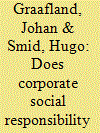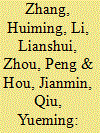|
|
|
Sort Order |
|
|
|
Items / Page
|
|
|
|
|
|
|
| Srl | Item |
| 1 |
ID:
130983


|
|
|
|
|
| Publication |
2014.
|
| Summary/Abstract |
Many studies have been performed to assess the impacts of corporate social responsibility (CSR) on the financial performance of companies. There are, however, very few studies that analyze how CSR policies and instruments affect the realization of social and environmental CSR goals, such as the reduction of workplace accidents or CO2 emissions. Therefore, it remains uncertain to what extent CSR really contributes to sustainable development and whether it can serve as an alternative to government regulation to internalize external effects from market operation. The present study provides an explorative empirical analysis that aims to fill this gap. We employ regression analysis on a sample of 109 Chinese companies. The estimation results show that having a code of conduct stimulates the implementation of other organizational CSR instruments, but CSR implementation only partly affects the realization of CSR goals. Having codes of conduct without implementing CSR does not have a significant impact on societal welfare.
|
|
|
|
|
|
|
|
|
|
|
|
|
|
|
|
| 2 |
ID:
127227


|
|
|
|
|
| Publication |
2014.
|
| Summary/Abstract |
Many countries are concerned with the waste-to-energy for economic development and societal welfare. This paper constructs a dynamic game model that, for the first time compares the incentive effects of four common subsidy modes on waste cooking oil supply for biofuel refining and sales of waste cooking oil refined products. The model considers the impact of preferential tax treatment, a raw material subsidy, a sales subsidy and an investment subsidy on the profits of biofuel enterprises and waste cooking oil recyclers. Results indicate that common approaches adopted in developed economies such as raw material price subsidies and finished products sales subsidies increase the profits of both biofuel enterprises and recyclers. On the contrary, investment subsidies, which are relatively common in some regions of China, increase the profits of recyclers, while reducing revenues achieved by biofuel enterprises. To promote the supply chain, policy should give priority to raw material price subsidies and finished products sales subsidies, and for investment subsidies, however, the government should be cautious.
|
|
|
|
|
|
|
|
|
|
|
|
|
|
|
|
|
|
|
|
|